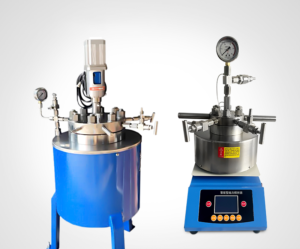Introduction: The Role of High Pressure Reactors in Laboratory Innovation
In the evolving landscape of chemical synthesis, high pressure stainless steel reactor systems play a pivotal role in pushing the boundaries of experimental research and industrial innovation. These reactors are essential in facilitating reactions that require elevated pressure and temperature, enabling the synthesis of complex compounds with controlled precision. With escalating demands for laboratory equipment that ensures safety, scalability, and real-time monitoring, manufacturers like Equilrxnlab have risen to the occasion, offering state-of-the-art high pressure reactor solutions built for reliability and performance.
Understanding the Core Structure of High Pressure Stainless Steel Reactors
The architecture of a high pressure stainless steel reactor combines materials engineering with mechanical resilience. Equilrxnlab’s FCF Series reactor is engineered using 304 and 316L stainless steel, offering both corrosion resistance and high mechanical strength. These materials are ideal for enduring aggressive chemical environments and repetitive thermal cycles, ensuring prolonged service life and consistent results.
Key structural components include:
- Flange connection design: Ensures secure sealing and easy disassembly.
- Mechanical stirring mechanism: Provides uniform mixing, crucial for reaction homogeneity.
- Manual or electric lift mode: Enhances accessibility and operational flexibility.
- Digital real-time display: Tracks temperature, speed, voltage, and time metrics simultaneously.
Technical Parameters and Versatility of the FCF Series
The adaptability of the Equilrxnlab FCF Series lies in its diverse volume configurations—from 0.1L to 50L, accommodating both micro-scale and pilot-scale operations. The pressure rating of up to 22 MPa and temperature tolerance up to 350°C make it a powerful tool for high-pressure hydrogenation, polymerization, and supercritical fluid reactions.
Performance Specifications:
| Parameter | Range |
|---|---|
| Volume Options | 0.1L–0.25L, 0.5L, 1L, 2L, 5L, 10–20L, 30–50L |
| Pressure Range | Up to 22 MPa |
| Temperature Range | Up to 350°C |
| Stirring Speed | 10–1000 rpm (adjustable) |
| Heating Power | 0.9 kW to 9 kW |
| Material | Stainless Steel 304 & 316L |
| Display | Real-time digital control panel |
| Connection Type | Flange |
| Heating Method | Electric |
| Lift Mechanism | Manual / Electric (optional) |
This broad specification spectrum enables the reactor to meet various experimental demands, from organometallic synthesis to advanced material development.
Application Domains: Where High Pressure Reactors Make an Impact
High pressure stainless steel reactor systems are indispensable in sectors that require precise thermodynamic control. Their use spans across:
- Pharmaceutical R&D: Synthesis of active pharmaceutical ingredients (APIs) under pressurized conditions.
- Catalyst Testing: Evaluation of catalytic activity in hydrogenation and hydroformylation.
- Materials Science: Development of metal-organic frameworks (MOFs), polymers, and nanomaterials.
- Petrochemical Research: Simulation of high-pressure refining processes and reaction pathways.
Equilrxnlab’s reactor system has been adopted by leading laboratories and research institutions for its seamless operation and robust output consistency. This reflects not only technical excellence but also the brand’s dedication to scientific advancement.
Digital Control and Monitoring for Precision
A defining feature of the Equilrxnlab FCF Series is its integrated real-time digital display system, which provides continuous feedback on reaction parameters. The precise control of stirring speed (10–1000 rpm for smaller models; 10–500 rpm for larger units) allows researchers to adjust flow dynamics based on viscosity or reaction kinetics. Moreover, temperature and voltage controls enable nuanced modulation of the thermal environment, which is critical in reactions sensitive to thermal gradients.
Heating and Stirring Mechanisms: Enabling Controlled Environments
The electric heating system is engineered for energy efficiency and uniform temperature distribution across the reactor wall. Heating power scales proportionally with the reactor volume, from 0.9 kW for smaller units to 9 kW for large-scale operations (30–50L).
Mechanical stirring enhances solute dispersion and prevents localized overheating, which can skew reaction outcomes. The adjustable stirring mechanism is synchronized with thermal controls to ensure cohesive reaction conditions.
Material Resilience and Corrosion Resistance
The use of 316L stainless steel, known for its molybdenum content, offers enhanced corrosion resistance against chlorides and acidic compounds—crucial for organic synthesis and pharmaceutical applications. This material advantage extends the life span of the equipment while maintaining high purity in reaction outcomes.
Ease of Use and Maintenance
Equilrxnlab designs its high pressure reactors with ergonomics and safety in mind. The manual lift system provides accessible reactor chamber opening, while the optional electric lift adds automated convenience for repetitive processes. The flange connections allow fast assembly and disassembly, which is especially beneficial in laboratory settings requiring batch processing.
To explore Equilrxnlab’s full product line, visit their product catalog. For specific inquiries or customization options, you may contact the team.
Social Channels for Research and Support
Equilrxnlab continues to support its global research community through active social engagement and technical updates. Explore tutorials, technical breakdowns, and user case studies through their official channels:
These platforms serve not only as marketing outlets but also as community hubs where researchers share experimental setups and performance feedback.
Scalability and Research Impact
From academic research groups to corporate R&D labs, the demand for scalable high pressure stainless steel reactor systems continues to grow. The Equilrxnlab FCF Series stands out by addressing critical needs: scalability, modularity, and material durability. Its volume options from 0.1L to 50L make it a highly adaptable platform that grows with the scope of the user’s research.
As materials chemistry and process engineering demand higher operational reliability, the FCF Series offers a standardized yet customizable solution that aligns with modern scientific workflows.
Summary Perspective
High pressure stainless steel reactors serve as the backbone for controlled synthesis in modern laboratories. The FCF Series by Equilrxnlab not only meets rigorous scientific standards but also evolves with the complexity of laboratory demands. With precision engineering, corrosion-resistant materials, and intelligent control systems, it supports a broad spectrum of applications that drive innovation across industries.
For researchers seeking stability, scalability, and scientific rigor in their reaction systems, Equilrxnlab’s high pressure stainless steel reactor is positioned as a technically advanced, long-term solution that seamlessly integrates into the laboratory ecosystem.




